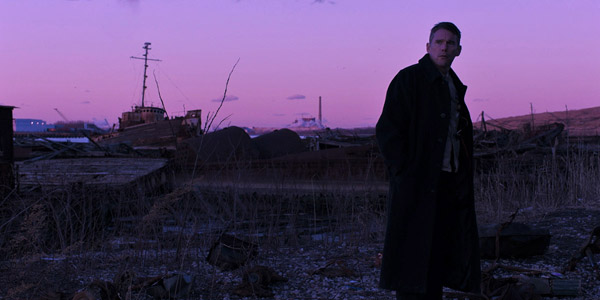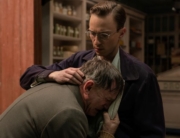![]() Writer/director Paul Schrader credits Polish filmmaker Pawel Pawlikowski’s 2013 film Ida for inspiring and convincing him that austere and serious films are possible and now easier to produce. At the post-screening Q and A of his new film First Reformed at the Toronto International Film Festival, he stated that films that would once have taken 40 days to produce now can be made in 20, thanks to digital technology. Like Ida, his new film is deftly made, full of intellectual vigor, and possibly his best in decades. It’s hard to believe that only last year he made the violent, over-the-top Dog Eat Dog. He completely switches gears here.
Writer/director Paul Schrader credits Polish filmmaker Pawel Pawlikowski’s 2013 film Ida for inspiring and convincing him that austere and serious films are possible and now easier to produce. At the post-screening Q and A of his new film First Reformed at the Toronto International Film Festival, he stated that films that would once have taken 40 days to produce now can be made in 20, thanks to digital technology. Like Ida, his new film is deftly made, full of intellectual vigor, and possibly his best in decades. It’s hard to believe that only last year he made the violent, over-the-top Dog Eat Dog. He completely switches gears here.
Schrader fans won’t have to pivot their expectations, though. His latest drama has themes that have weaved in and out of his films for decades, voiced here through an ex-military chaplain (in Iraq) and the current minister of a dwindling Dutch Reformed congregation in upstate New York, built in 1767 and about to celebrated its 250th anniversary.
The pensive and sneakily suspenseful film announces from its first frame that this will be a different type of movie. Like Ida, it was shot in the Academy aspect ratio (1.37:1), which, unlike a widescreen frame, reveals “more of the human body,” according to Schrader. It’s also a technique that the director says withholds by narrowing the field of vision, leaving a lot out of the frame.
One audience member described it as a man-holed-up-in-his-room type of film. And it is, but also a lot more. Reverend Toller (Ethan Hawke, in a career-high performance) sits in his kitchen under a bare light bulb, next to an unfurnished living room, writing his journal, a nightly ritual he refers to as a form of prayer. He has sworn to himself to write for one year and then destroy it.
After a typically sparsely attended church service, a young woman approaches the minister seeking his counsel for her husband. Mary (a name probably not accidentally chosen) is played by Amanda Seyfried, in a role that brings to the movie a softer, hopeful presence and a much-needed counterbalance to the more reserved and somber Toller. She’s pregnant, but she says her husband, Michael, “wants to kill our baby.”
What follows is more a debate than counseling session between the 46-year-old reverend and Michael (Philip Ettinger), an ardent, and possibly extremist, environmental activist. For Toller, hope and despair are intertwined in life. Michael needs more certainty, though, and only sees despair—how could he bring a child into the world knowing of the ticking climate time bomb? (The dialogue took on special resonance less than a week after Hurricane Irma hit Florida and while Houston was still recovering from Hurricane Harvey.)
The younger man further questions whether God can forgive mankind for what it has done to this world. For the rest of the film, this question takes on an urgency of its own for the reverend: he’s urinating blood. Drinking bottles of whisky mixed with Pepto-Bismol isn’t doing wonders for his health, either. And because this is a Schrader film, viewers should be not be surprised when the plot takes a darker, more disturbing, and left-field turn.
The dialogue is lively without becoming pedantic, though viewers may want to brush up on Thomas Merton or Revelations 11:18. Given that so many films take years to make, to the extent they feel dated by the time they come out, First Reform is very much of the moment. Hawke’s work here is effortless, his earlier personas invisible. As an actor, he’s long been a great listener, a quality that comes in handy for playing a man of the cloth.
After the screening, Schrader mentioned that he first became interested in writing scripts more than 45 years ago after seeing Robert Bresson’s Pickpocket, where a man writes in his journal, commits a crime, and goes back to writing. There are obvious references to that film, as well as Bresson’s Diary of a Country Priest and Schrader’s earlier works, especially Taxi Driver, though with a different temperament and without the violence. The director joked that viewers could freeze-frame the DVD to catch all the references.
First Reformed is a stealthily engrossing work that should appeal to viewers who haven’t seen, say, Affliction.







Leave A Comment